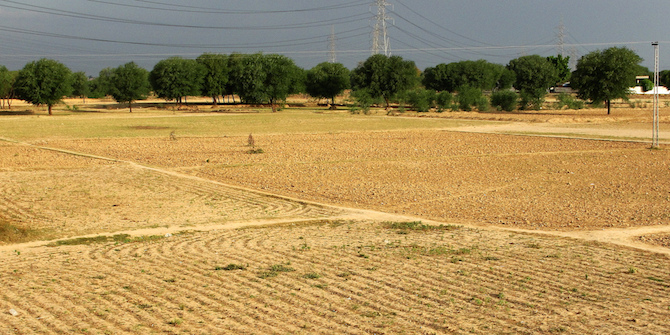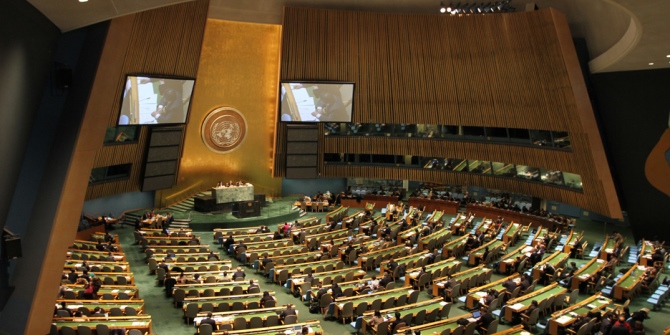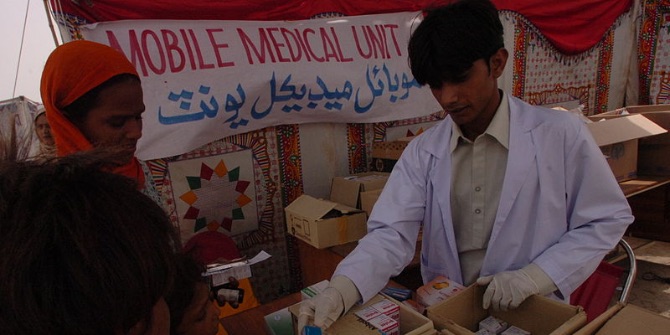 All the countries in South Asia are already confronting the realities of climate change. In this article Ghamz E Ali Siyal draws on field studies conducted by the Sustainable Development Policy Institute to demonstrate how climate change is driving migration in the semi-arid regions of Pakistan.
All the countries in South Asia are already confronting the realities of climate change. In this article Ghamz E Ali Siyal draws on field studies conducted by the Sustainable Development Policy Institute to demonstrate how climate change is driving migration in the semi-arid regions of Pakistan.
According to numerous reports by the Intergovernmental Panel on Climate change (IPCC), climate change is undeniable and there is an urgent need for all countries to prepare adaptation and mitigation plans. However, climate change has become a tug of war between different countries, with some pulling to highlight the need to act and others rejecting the evidence that is available. In case of Pakistan, the acceptance of the Climate Change Bill by the National Assembly in 2016 and the Senate in 2017 gives a clear signal that steps supported by an allocation of funds are being taken to address it.
Muller et al’s study on disaster-induced migration in Pakistan highlights how climate change is already a key driver of migration. Floods and heat stress are forcing people from their homes and in many cases these people remain displaced without any compensation from government or other organisations. These trends are therefore being discussed, but do we have micro-level examples or case studies to illustrate what is happening?
While working in the Environment and Climate Change Unit (ECCU) of the Sustainable Development Policy Institute (SDPI), I was part of a project called Pathways to Resilience in Semi-Arid Economies (PRISE) which conducted field surveys that found evidence of climate induced migration in urban areas of three districts, namely Dera Ghazi Khan, Faisalabad, and Mardan. In these selected districts, respondents from Dera Ghazi Khan (Punjab) had experienced the most severe climatic changes and disasters, as compared to the migrants in urban Faisalabad (Punjab) and Mardan (Khyber Pakhtunkhwa).
The impact of climate change in many cases was found to be indirect in its nature. Firstly, it affected people’s health, which then influenced their decision to migrate. Secondly, uncertain rains were observed to be negatively affecting agriculture. It was found that wheat in particular suffered heavy losses due to the erratic rains during harvesting. The lack of rain and increased temperatures resulted in reduced fodder for livestock, which meant people had to travel further to collect sufficient food for their animals, and more pest attacks. Farmers therefore had to invest more in pesticides to protect their crops, particularly cotton. Thirdly, frequent flooding resulted in heavy losses, from crops to infrastructure to private property. The floods also increased salinity levels in the soil, which has continued to impact its productivity after the waters have receded.

Climate change has also affected businesses in D. G. Khan. One respondent described how abrupt torrential rains reduced the number of days their construction business could operate. Longer periods of heat stress have impacted working environments, with respondents who worked in factories reporting that the heat made conditions unbearable. This pushed some to quit their jobs and set up small businesses, or else take up labouring in comparatively less heat stressed contexts. Many also moved due to a lack of housing options equipped for the increasingly extreme climate.
Faisalabad also experienced extreme heat and reduced rainfall, which resulted in lower crop productivity and income. The poultry and meat business has been affected by the shorter warmer winters in recent years, and business owners have been forced to relocate to cities in order to expand their customer base and maintain their incomes. Furthermore, rainfall shifts have increased viral diseases like flu and diarrhoea in the community (although this has opened up opportunities for pharmaceutical companies due to the increased demand for medicines). The lack of demand for warm clothes has impacted the garment industry, so factory workers in this sector have experienced a reduction of their working hours and consequently their pay. Many of these workers ended up moving to urban areas in search of other employment opportunities.
In Mardan there were fewer cases of climate change reported by urban respondents but few were untouched. For example, one respondent who was a rickshaw driver described how when he lived in a rural area, excessive rains negatively affected his business because they disrupted the roads and increased the cost of maintaining his rickshaw. Relocating improved his situation because the infrastructure is better in urban areas. Two respondents who worked in casual agriculture labour and at plant nurseries described how their wages had decreased, again because of the impact of climate change on the productivity of crops and germination of plants.
These cases give a clear idea of how climate change is affecting agriculture and other sectors in semi-arid regions of Pakistan. It is prompting rural populations to migrate and seek work in urban areas. Climate resilient policies are therefore urgently: in the agricultural sector, shifting to sustainable cropping patterns, improving early weather warning systems, and initiating crop insurance would be a good starting point. The business and industrial sectors should take similar steps to adapt. Without major interventions the economic contributions of rural areas will continue to decline, while cities and towns will struggle as the growing population puts pressure on urban infrastructure and services. The Government of Pakistan has passed the bill on climate change, now we need to see the initiatives for reducing vulnerabilities and improving resilience in our communities.
This article is based on research conducted as part of the PRISE project, which had a sub-theme on Internal Migration. It was funded by International Development Research Center (IDRC) and Department of International Development (DfID).
This article gives the views of the authors, and not the position of the South Asia @ LSE blog, nor of the London School of Economics. Please read our comments policy before posting.
About the Author
 Ghamz E Ali Siyal is a Project Assistant on the Pathways to Resilience in Semi-Arid Economies (PRISE) project. This is based in the Environment and Climate Change Unit of the Sustainable Development Policy Institute (SDPI). The author can be contacted at ghamzeali@sdpi.org
Ghamz E Ali Siyal is a Project Assistant on the Pathways to Resilience in Semi-Arid Economies (PRISE) project. This is based in the Environment and Climate Change Unit of the Sustainable Development Policy Institute (SDPI). The author can be contacted at ghamzeali@sdpi.org







